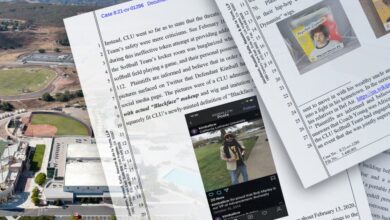Texas A&M University Abruptly Shuttered a Climate Lab, Citing Security Risk

[ad_1]
A climate-science lab at Texas A&M University has been shut down after its ties to a Chinese university were deemed a security risk.
The International Laboratory for High-Resolution Earth System Prediction, or iHESP, was formed in 2017 between Texas A&M, the National Center for Atmospheric Research, in Colorado, and the Qingdao Pilot National Laboratory for Marine Science and Technology, in China. The three institutions had agreed to share funding, experts, and computing power to develop fine-grained computer models predicting how climate change would affect the Earth.
The first phase of the partnership was set to last through 2023. But in December 2021, the project was unexpectedly terminated, effective immediately.
The closure was attributed in part to financial troubles with the Chinese partner. The Qingdao laboratory hadn’t delivered on a promised $2 million payment to fund iHESP, said Kelly S. Brown, a spokesperson for Texas A&M. Even had the lab not defaulted on the money, however, it would have faced another barrier: The Texas A&M University system had marked the iHESP contract for termination.
The lab was on a list of foreign agreements that the system wanted the College Station campus to terminate because of national-security fears. The Texas A&M system did not respond to The Chronicle‘s questions about how the system determined iHESP was a security risk, and did not address questions about other contracts on its list for termination.
The Texas A&M University system had evaluated Chinese and Russian agreements of all kinds, including “animal-use, study abroad, gifts agreements, book publishing agreements, nondisclosure agreements,” Brown said. It made individual decisions about which such partnerships posed risks that scientists might steal technological know-how, to the military or economic benefit of another country, she said.
A spokesperson for the National Center for Atmospheric Research said the decision to end iHESP originated from Texas A&M. The center halted its work on the project on January 31, and “seven to eight” center staff members lost part of their funding as a result. Those staff members were moved to other projects, the spokesperson wrote in an email.
Emails and calls to the Qingdao national lab, sent Friday night, local time, weren’t immediately returned.
Collaborating With the FBI
The lab closure came just in time to respond to some political pressure. In February 2022, Marco Rubio, the Republican senator from Florida, posted publicly that he had sent letters to 22 U.S. universities, urging them to end academic and research partnerships that could benefit the Chinese military. In his letter to John Sharp, chancellor of the Texas A&M University system, Rubio called on the College Station campus to terminate its partnership with Ocean University of China, which is based in the city of Qingdao and works with the Chinese navy.
Rubio’s letter never names iHESP, but Ocean University is listed as a member institution of the Qingdao Pilot National Laboratory, iHESP’s Chinese partner. And a faculty page for Lixin Wu, director of the Qingdao lab, says he is also vice president of Ocean University.
Sharp and M. Katherine Banks, the College Station campus’s president, wrote back to Rubio, in a public letter dated the next day: “With respect to your questions regarding Texas A&M University affiliations with Ocean University, those affiliations no longer exist or are being terminated as part of our rigorous, ongoing review and collaboration with the Federal Bureau of Investigation (FBI). No further university-sanctioned research will occur.”
Brown said that over the last year, Texas A&M University has terminated three dozen foreign agreements in the course of regular, rolling reviews. Before that, the university also ended one professor’s position over fears of Chinese government influence: Zhengdong Cheng was arrested and charged with hiding ties to a Chinese university in 2020. His case is still pending.
In late February, the Department of Justice announced an end to its controversial China Initiative, a Trump-era effort to keep China from stealing U.S. intellectual property via academic cooperation, which resulted in few successful prosecutions. Critics of the initiative said it had created an atmosphere of intolerance against researchers of Chinese descent.
‘There’s No Winner Here’
But even if an era of suspicion of Chinese academic collaborations is ending, the repercussions continue. The sudden termination of iHESP created hardships for some lab members, sources familiar with the lab told The Chronicle. Lab staff are reportedly funded through the end of May, and then must find other jobs. (Brown could not confirm the fate of iHESP employees.) For staff members still trying to establish their careers in science, losing the lab prematurely throws up obstacles to finishing their research and publishing papers, key to career advancement.
It’s also a loss for science. iHESP had provided data cited in a major international climate report, among other publications.
The world’s climate models are getting better all the time, but predicting how rising global temperatures will affect local weather is still difficult because it requires so much computing power, researchers at iHESP wrote in a paper published in the Journal of Advances in Modeling Earth Systems in November 2020. “Through international collaboration, we are able to address this challenge,” they wrote.
“There is no winner here,” said Xuebin Zhang, a climate researcher with the Canadian government who is not involved in iHESP. He said he could not assess iHESP’s security risk, but noted that international cooperation is essential not only to mitigating the effects of climate change, but even to just studying it. The computing power required is such that “no single country can actually do it well,” he said. “We need to pull all the resources we have from the entire world.”
[ad_2]
Source link






